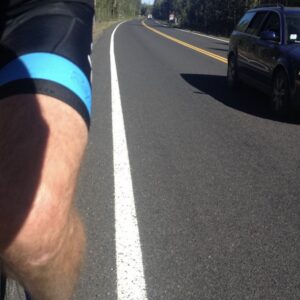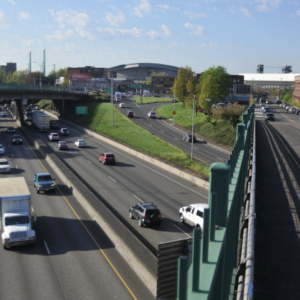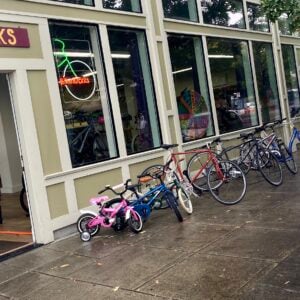“There are concerns that bicyclists don’t pay their fair share… This bill provides an avenue for those of us that support bike and pedestrian facilities to provide additional funding.”
— Sen. Jackie Dingfelder
Oregon lawmakers considered a bill yesterday that would allow Oregonians to make a voluntary donation to bicycle trail projects through their annual motor vehicle registration renewal. Senate Bill 756 didn’t get a vote, but it gave bike advocates and members of the Senate Committee on Business and Transportation a lot to think about it.
Senator Jackie Dingfelder (D-Portland), the bill’s co-sponsor along with Floyd Prozanski (D-Eugene), told the committee that she’s, “Been concerned” over the years with legislators who have proposed various bicycle taxes and mandatory registration concepts. “That being said,” she testifed, “There are concerns that bicyclists don’t pay their fair share. I think we already do pay our fair share, and this bill provides an avenue for those of us that support bike and pedestrian facilities to provide additional funding.”
The bill seeks to funnel voluntary donations to the existing Oregon State Parks and Recreation Fund. The money would be directed specifically toward Parks’ Scenic Bikeways program via a check-box on vehicle registration forms sent out by the DMV. Dingfelder called it an “innovative approach” and said it’s a “ready-made program.”
Jerry Norquist, former executive director of Cycle Oregon and president of the Bicycle Tour Network, is the architect of the bill. Norquist has considerable experience in the legislature on a number of issues and he also spearheaded Oregon’s Share the Road license plate. During his testimony yesterday, Norquist wanted to paint a picture of massive popular support for bicycling in Oregon. He pointed out that the Share the Road plate is the “Most successful group plate ever issued in our state,” with over 17,000 plates sold so far.
Norquist pointed the major economic impact of bicycling on our state and told lawmakers, “I think we are poised to be the #1 bicycle destination in the country… Cycle Oregon alone contributes $5.5 million per year to the state’s economy.”
“We have this great activity,” he added, “but we don’t have the infrastructure to do it.”
“What can we do to get you the infrastructure you need? We’re getting a lot of tourism out of it.”
— Sen. Fred Girod
For Norquist, the passage of SB 756 would mean much-needed dedicated funding for the State Scenic Bikeway program, which has been runaway success in just a few short years despite operating on a shoestring (the program’s seed funding came via a Cycle Oregon grant).
Asked by a Senator how much he expects the bill to raise each year, Norquist estimated the annual contribution of between $50,000 and $6 million. He based his estimate on the 250,000 renewals sent out by the DMV each month (a figure that was contested by the DMV later in the hearing). Even on the low end at $50,000 a year in contributions, Norquist said the Scenic Bikeway program would return millions to the state in tourism and related impacts. “We need a consistent funding source,” he said, “and I think this bill would provide that.”
Throughout the hearing Senators seemed intent on sharing their own ideas about how to raise money for bicycle-specific infrastructure. Senator Fred Girod (R-Stayton) wondered why SB 756 is preferable over bicycle registration, an idea he thinks would raise much more money. Senator Bruce Starr (R-Hillsboro) proposed a tax on bicycle tires. One Senator jokingly suggested a spandex tax that could be levied by the square foot.
Ultimately, Sen. Girod said he likes SB 756 but questioned whether it would raise enough money to “get you where you need to go.” “What can we do to get you the infrastructure you need? We’re getting a lot of tourism out of it.” In response, BTA lobbyist Jonathan Manton explained to Girod that this bill isn’t intended as “an answer to the dire funding situation we face.”
“When folks say this is just adding a check-box to a form, that’s the front end, but the back end of it is quite a bit more complex than that.”
— Amy Joyce, Oregon DMV
Girod made it clear that he supports raising funds for bicycle infrastructure only if it comes directly from people how ride bicycles. “I hate to say it, but you guys need to put some skin in the game. It’s just a matter of figuring out how.”
The final person to offer testimony on the bill was Amy Joyce, a spokeswoman for the Oregon DMV. Joyce tamped down assertions by Dingfelder and Prozanski that the bill would be as simple as adding a checkbox to a few forms. The DMV is already on record as saying SB 756 would require 900 hours of staff time and programming to implement (a number scoffed at by several Senators). Joyce also spoke to the many logistical considerations this bill would bring up. “We send out 1.5 million renewals each year and we have about five different ways of processing them and all these different ways would have to be changed in order to receive a donation.”
“When folks say this is just adding a check-box to a form,” said Joyce, “That’s the front end, but the back end of it is quite a bit more complex than that.”
Joyce did however, offer up one feasible option. One of the ways people renew their licenses is via the DMV website. Joyce said they’ve already begun discussions with State Parks about how an online donation could be implemented. “If we limited it to online registration renewal only, that could be done for next to nothing.”
The downside of the online-only option is that the donation solicitation would reach only about 16% of Oregonians. Joyce explained that only about 20,000 renewals a month — out of 120,000 a month — are done online.
Joyce also had another word of caution that resonated with the lawmakers: “If we do this, there’s no doubt there would be new comers with each new legislative session.” In other words, if SB 756 is passed, it would open the floodgates for similar donation requests (like the donation section of tax returns).
In the end, the Committee did not take a vote on the bill. “We will think about this for a while,” said Chair Lee Beyer. Stay tuned.
More 2013 Legislative Session coverage in the archives.





There are a number of things that first go through my head with this… one is that I don’t think this will do much of anything to stop the ‘cyclists don’t pay their share’ rants, as this money will not go into general transportation funding, which means we’re still not paying ‘for the roads’ (as far as that stupid argument goes). Maybe it will help a little if this money actually builds separated infrastructure for bicycles along these scenic bike routes, as then people on bicycles won’t be using what most people consider ‘the roads’.
Secondly, it’s a dedicated funding source, with all the caveats – would this then become the only money that could be spent on the bikeways? Will it be the first thing to be slashed next legislative session when money is tight? Will it be relegated to ‘special interest’ funding in the public and political realm? How will decreasing car ownership effect revenues – particularly among people who ride bicycles for transportation (who may be more likely to give up a car than others).
Thirdly, we care enough to build infrastructure along scenic bike routes to bring in tourism money, but not throughout our cities and towns to save the lives of our citizens? Doesn’t exactly make you feel very special, does it?
Sen. Dingfelder: “I think we already do pay our fair share, and this bill provides an avenue for those of us that support bike and pedestrian facilities to provide additional funding.”
I’m sorry to have to say this, but where do these people learn logic?! The thinking here is so wacked.
It is easy to look up that those who don’t drive (different than those who bike) typically overpay through taxes for transport infrastructure.
“Asked by a Senator how much he expects the bill to raise each year, Norquist estimated the annual contribution of between $50,000 and $6 million.”
I feel like I’m reading an article on The Onion.
What is the problem that they are trying to solve? What study shows that it really is a problem?
The problem?
Bad press on CRC vote? Useful distraction?
9watts,
You’re off base. Sen. Dingfelder voted against the CRC bill and this bill was being crafted long before this legislative session even started. It was also crafted by advocate Jerry Norquist, who I think you’ll agree has no connection to the CRC whatsoever. Calling this a “distraction” isn’t really accurate IMO. I feel that Norquist and Dingfelder are making a sincere effort to raise money for bike projects and this is their idea for how to go about it given the very real political and funding constraints surrounding the issue.
Do I love the framing of this bill or the gist behind it? Not really. But, unlike other bike-oriented funding bills/ideas that have come out of Salem in recent years, I think this one deserves a fair shake.
I stand corrected. Thanks.
Their way to raise money for bike projects is to perpetuate a lie propagated by interests opposed to human-scale cities? That isn’t what I’d call “framing” of an issue (although it does tend to pass for it in today’s political climate). How about framing the issue in facts showing how much SOV fees contribute compared to how much SOVs consume, and how building safe bike routes will free up road space and road budgets?
In Oregon, about 25% of road funding comes from user fees. The rest comes from taxes that EVEN CYCLISTS pay. See:
http://subsidyscope.org/transportation/direct-expenditures/highways/funding/state/
Now now, let’s be honest and informed of Real Fact and not deluded by Good Fact.
In the supplied link it gives user revenues both at the state level and local level from the years 1995-2007.
Only in the year 2005 did the state user revenue level drop to 25%, also included in the total funding was 1% local user revenue.
In 2007 those popped back up to 35% and 5% respectively.
While local user revenue has historically been a very small portion, only in 2007 clearing 2%, state user revenues show as 50% back in 1995 with a mostly steady decline to their low of 25% in 2005.
Obviously ODOT & the state are aware of the impending failure of petroleum per gallon taxation as a dependable funding model but don’t pretend that it hasn’t been a major historic funding path for the public road system.
All that said: lunkheads like Sen Girod need to be reminded/educated how much us non-drivers are being bled by our non-driving related tax dollars going to prop up the failing road funding system.
If this passes, support for funding future infrastructure will dry up, at least for those elected officials at the margin, the ones that vote “For” but are looking for a reason not to.
I propose a similar thing to fund the CRC in Oregon and in Washington. Come on, motorists, you guys need to get some skin in the game!
“No skin in the game” – If inaccurate statements like this are not addressed then any voluntary donations will become the only recognized source of funding for bike transportation.
A concern of mine as well. I can imagine uninformed folks saying:
“The gas tax provides millions each year, and people who bike only provide $50K a year…”
Perhaps an idea for addressing that would be to expand it: have a check box for scenic bike routes, one for rail/transit, and one for pothole maintenance or something. Other ideas?
It also propagates the absurd notion that the monikers “cyclist” and “motorist” are mutually exclusive. So when folks are contributing at the DMV, the “skin” is already in!
So… if it takes the DMV 900 hours to make this addition to their existing infrastructure, how much would it take to add bike licensing? Did somebody ever do calculations on that? I also imagine that the DMV would have to hire additional workers, there would be long lines… is there any calculation how many years it would take before bike licensing would actually make money that would go towards street improvements?
Not to diss the effort it takes to organize rides, but a ride for scenic tours might be more effective to raise money…
Oregon Scenic Bikeways program seems to consist of identifying a route, creating a map, and adding identifying signs along the route.
Is there more to it than this?
and the O comes through with a typically awful headline: “How can Oregon cyclists help pay their way? Suggestions abound but solutions are tougher” The bill isn’t a bad idea necessarily but even bringing it up just gives the O and others the chance to reinforce the false notion that cyclists aren’t already paying more than their fair share for road maintenance.
You hit the nail on the head, Bjorn.
Dingfelder’s contortionist framing of this idea left the door wide open to this (predictable) sort of mischief.
And Norquist’s quote (perhaps taken out of context, who knows) doesn’t undermine this mistaken premise one bit.
Things that usually make me think people have no clue what it is like to ride a bicycle for transportation:
1. “…[Y]ou guys need to put some skin in the game.”
I find this insensitive–borderline offensive–every time I hear it. Nobody has more literal skin in the game than those who would leave the car at home and use a bike to get around in traffic. To say nothing of the taxes and fees that already come from bicycle users and go toward road construction and maintenance. If you’re going to perpetuate a myth, find another catchphrase to do it with.
“You guys”?? Really?
2. Spandex jokes.
Ha, ha. I get it. Bike riders are goofballs that we don’t have to have any respect for if they wear spandex. I say, “don’t knock it just ‘cuz you can’t rock it.”